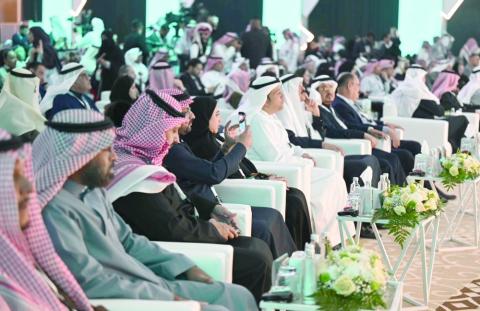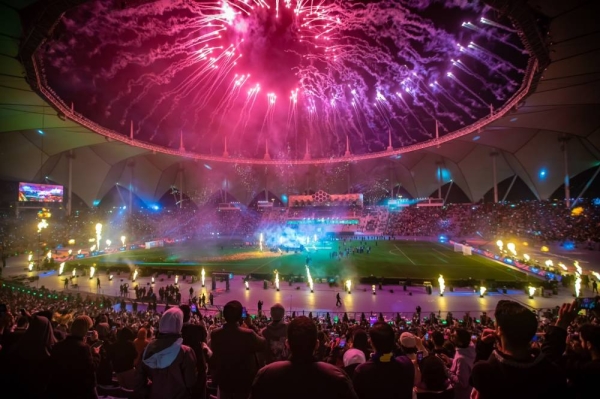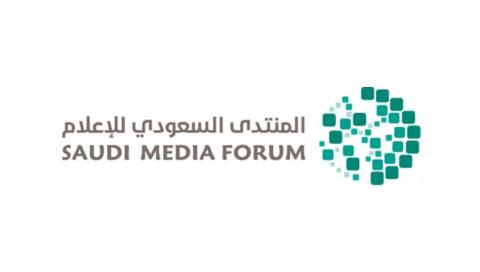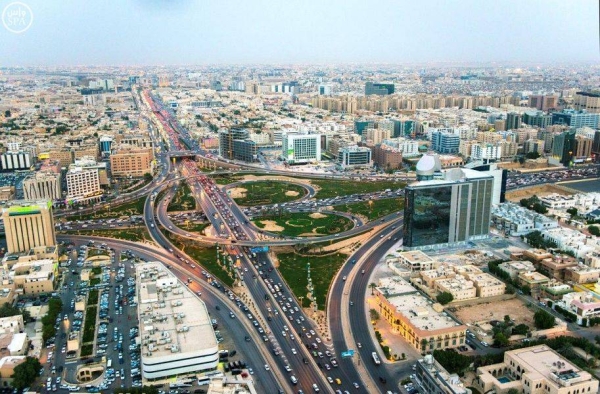
Experts and participants in the Saudi Media Forum have emphasized the need to consciously keep pace with the transformations of the media environment.
They also identified means to develop media discourse and the performance of institutions and individuals working in the sector, to meet the expectations of the public, which they said was an influential and active element in the media industry.
Mohammed bin Fahd Al Harthi, CEO of the Saudi Radio and Television Corporation, stressed that progress was the inevitable language of our era. He noted that the essence of the Saudi Vision 2030 was human development, adding that the media was an integral part in this process.
The Saudi Media Forum kicked off on Monday in Riyadh, in the presence of local and international industry leaders, experts and analysts.
The two-day forum features more than 100 working papers and brainstorming sessions and workshops, with the participation of international experts to formulate recommendations on improving media content and suggesting solutions to challenges facing the sector.
Topics discussed at the event include, among other, “The New Media Generation and the Culture of Rapid Changes”, “Digital Influencers: Media or Advertising” and “Media... and the Ethical and Practical Implications of Using Artificial Intelligence”.
In his opening speech, Al Harthi said that the forum was being held at an important development stage for Saudi Arabia, stressing that media freedoms should not tolerate hate speech and insulting religions and religious symbols.
During the first day of the forum, participants reviewed the pillars of developing the media sector and keeping pace with the changes. Saudi officials underlined the need to promote a skillful and balanced media discourse that relies on facts and objectivity.
Saudi Minister of Energy Prince Abdulaziz bin Salman pointed to the importance of accepting criticism, different opinions, and the diverging viewpoints.
He noted that an official must be in a state of sustainable disclosure, to enhance the public opinion’s trust, while maintaining pragmatism and openness.
“Criticism is a process of evaluating an activity or an official. If criticism is taken with this positive view… public benefit will be achieved,” he told the attendees.
The Saudi media sector
For his part, Majid Al-Qasabi, the designated Saudi Minister of Information, said that the world has become inter-connected through instant communication, which has eliminated geographic barriers.
He added that the media sector in Saudi Arabia was promising and full of opportunities.
The sector’s integrated system, which consists of four entities, is working to achieve a quantum leap, keeping pace with the deep and wide transformations in Saudi Arabia, the minister remarked.
Al-Qasabi also stressed that the media sector in the Kingdom offered wide investment and development opportunities for creativity and content industry.
He said that work was underway to address the main obstacles facing the industry, by building the appropriate infrastructure, enacting the adequate regulations and laws, and developing training programs for emerging competencies, as well as supporting creativity and innovation capabilities.
Moreover, Al-Qasabi pointed to the importance of enabling the sectors that operate in the media and promoting qualitative investments in this field.
The Information minister unveiled the objectives set by the Saudi media bodies, which he said were focused on building leading media companies, developing distinguished local cadres, raising the quality of local content, and empowering entrepreneurs.
In addition, he highlighted the necessity to develop the soft media, which reaches the global public opinion without the need for translation, and to increase the level of the media mix that covers all audience interests, including areas that were not previously explored.
Saudi Arabia, the biggest untold story
Saudi Minister of Investment Khalid Al-Falih said that the Kingdom was “the biggest untold story.”
He explained that the country was an “undiscovered treasure” for the world’s public opinion, except for elite politicians and companies.
The media has a major role in unveiling the real story and showing the Kingdom for what it really is, Al-Falih told the forum.
As for the specialized economic media, the minister pointed to the need for a large number of cadres and specialists to publish accurate economic news and analyze information, in order to keep pace with the increasing volume of demand, opportunities and investments.
He added: “We also need channels and platforms to compete with international media institutions in the economic field, with all the influential analytical, scientific and media capabilities.”
Al-Falih stressed that the Kingdom sought to provide an integrated platform for multiple economic sectors, offering profitability, competitiveness and integration between all components of the Saudi, regional and international economy.
In this context, he stressed that the Saudi economy was linked to its regional and global environment, which should be reflected in the media performance.
Saudi Vision 2030 addresses the economic aspect with an international dimension, and supports leadership in technology, innovation and other sectors, the minister remarked.
He added that the Saudi strategy relied on attracting the decision-making centers of major regional companies, in order to exchange interest and achieve integration with the Kingdom’s market and investment opportunities.
Al-Falih noted that 44 global companies were moving their regional head offices to the capital, stressing the need for specialized and conscious media support that rises to the level of this challenge.









